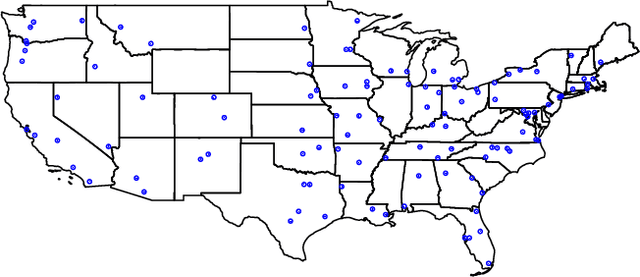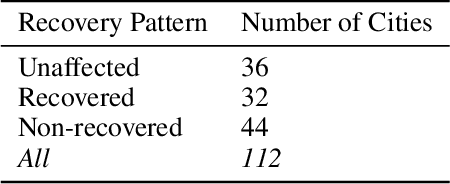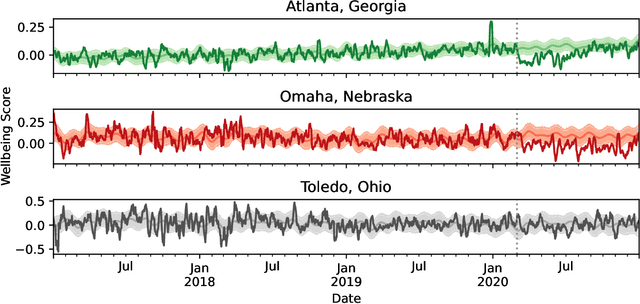MeiXing Dong
We Are in This Together: Quantifying Community Subjective Wellbeing and Resilience
Aug 23, 2022



Abstract:The COVID-19 pandemic disrupted everyone's life across the world. In this work, we characterize the subjective wellbeing patterns of 112 cities across the United States during the pandemic prior to vaccine availability, as exhibited in subreddits corresponding to the cities. We quantify subjective wellbeing using positive and negative affect. We then measure the pandemic's impact by comparing a community's observed wellbeing with its expected wellbeing, as forecasted by time series models derived from prior to the pandemic.We show that general community traits reflected in language can be predictive of community resilience. We predict how the pandemic would impact the wellbeing of each community based on linguistic and interaction features from normal times \textit{before} the pandemic. We find that communities with interaction characteristics corresponding to more closely connected users and higher engagement were less likely to be significantly impacted. Notably, we find that communities that talked more about social ties normally experienced in-person, such as friends, family, and affiliations, were actually more likely to be impacted. Additionally, we use the same features to also predict how quickly each community would recover after the initial onset of the pandemic. We similarly find that communities that talked more about family, affiliations, and identifying as part of a group had a slower recovery.
Room to Grow: Understanding Personal Characteristics Behind Self Improvement Using Social Media
May 17, 2021



Abstract:Many people aim for change, but not everyone succeeds. While there are a number of social psychology theories that propose motivation-related characteristics of those who persist with change, few computational studies have explored the motivational stage of personal change. In this paper, we investigate a new dataset consisting of the writings of people who manifest intention to change, some of whom persist while others do not. Using a variety of linguistic analysis techniques, we first examine the writing patterns that distinguish the two groups of people. Persistent people tend to reference more topics related to long-term self-improvement and use a more complicated writing style. Drawing on these consistent differences, we build a classifier that can reliably identify the people more likely to persist, based on their language. Our experiments provide new insights into the motivation-related behavior of people who persist with their intention to change.
Cruciform: Solving Crosswords with Natural Language Processing
Nov 23, 2016



Abstract:Crossword puzzles are popular word games that require not only a large vocabulary, but also a broad knowledge of topics. Answering each clue is a natural language task on its own as many clues contain nuances, puns, or counter-intuitive word definitions. Additionally, it can be extremely difficult to ascertain definitive answers without the constraints of the crossword grid itself. This task is challenging for both humans and computers. We describe here a new crossword solving system, Cruciform. We employ a group of natural language components, each of which returns a list of candidate words with scores when given a clue. These lists are used in conjunction with the fill intersections in the puzzle grid to formulate a constraint satisfaction problem, in a manner similar to the one used in the Dr. Fill system. We describe the results of several of our experiments with the system.
 Add to Chrome
Add to Chrome Add to Firefox
Add to Firefox Add to Edge
Add to Edge